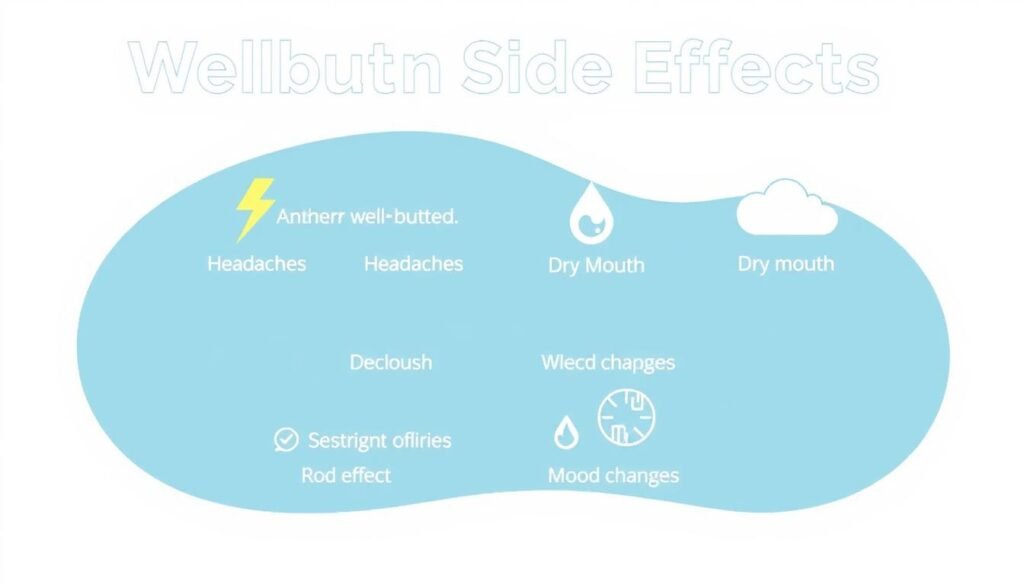About 2% of people stop taking Wellbutrin because of anxiety side effects. Wellbutrin, or bupropion, is an antidepressant. Since 1985, it’s been used to treat depression, seasonal affective disorder, and help quit smoking. Though effective for anxiety, users may face side effects that affect their treatment experience.
This guide highlights the common side effects of Wellbutrin for anxiety. It explains how Wellbutrin works for anxiety and gives tips to handle side effects. Knowing these details can help users get the most out of their anxiety treatment with Wellbutrin.
Key Takeaways
- Wellbutrin can cause a variety of side effects, including anxiety-related symptoms.
- Monitoring blood pressure is essential as high blood pressure can be a serious side effect.
- Users should be cautious about alcohol consumption to minimize seizure risks.
- Regular check-ups are advised to detect any potential vision changes.
- Informing healthcare providers about Wellbutrin use is crucial before medical tests.
Understanding Wellbutrin and Its Uses
Wellbutrin is also known as bupropion. It is a different kind of antidepressant mainly used to tackle major depression and seasonal affective disorder. It helps by increasing the levels of certain neurotransmitters, dopamine, and norepinephrine. These are vital for mood regulation. Hence, Wellbutrin falls under the category of norepinephrine-dopamine reuptake inhibitors (NDRIs).
Besides its main uses, Wellbutrin is also prescribed for anxiety, ADHD, and other conditions, though not officially approved for them. This makes Wellbutrin a favored choice for those not helped by standard treatments. The reason is it can effectively ease anxiety symptoms for many.
Starting Wellbutrin can be beneficial, but it requires careful dose management and monitoring. It might take weeks to fully work. Suddenly stopping it can lead to severe side effects. Knowing how it interacts with other drugs, especially those for anxiety and more, is vital.
For those considering Wellbutrin for anxiety, the dosage guide is a helpful resource. It provides crucial details on treatment plans and safety measures. Getting to know more about Wellbutrin helps in managing depression and improving mental health overall.
What is Bupropion HCl?
Bupropion HCl is the main ingredient in Wellbutrin, a type of Norepinephrine-Dopamine Reuptake Inhibitor (NDRI). This medication increases neurotransmitter levels that are often low in those with depression and anxiety. Unlike typical antidepressants, bupropion focuses less on serotonin, offering a different way to treat these conditions.
Doctors prescribe Wellbutrin for major depressive disorder (MDD) and to prevent seasonal affective disorder (SAD). It comes in extended-release (XL) and sustained-release (SR) tablets. Each type has its own advantages, following healthcare providers’ advice.
Knowing the side effects of bupropion HCl is important. Common ones include dry mouth, insomnia, and dizziness. There are also mild issues like nausea and constipation. More serious side effects can occur, such as seizures and increased suicidal thoughts, which need careful watching.
Bupropion HCl plays a key role in treating anxiety and depression. Patients and doctors should work together for the best results.
| Attributes | Details |
|---|---|
| Drug Class | Norepinephrine-Dopamine Reuptake Inhibitor (NDRI) |
| Common Uses | Major Depressive Disorder (MDD), Seasonal Affective Disorder (SAD) |
| Forms Available | Extended-Release (XL), Sustained-Release (SR) |
| Common Side Effects | Dry mouth, insomnia, dizziness, nausea, constipation |
| Serious Side Effects | Seizures, suicidal thoughts, severe allergic reactions |
| FDA Warnings | Risk of suicidal thoughts and behaviors |
Common Side Effects of Wellbutrin for Anxiety
Wellbutrin is mainly used to fight depression, but it’s also used off-label for anxiety. Those finding mental health relief should be aware of Wellbutrin side effects list with various symptoms. Knowing about these side effects can help people manage their treatment better.
Overview of Common Side Effects
Many people feel different symptoms when they start with Wellbutrin. The most common side effects of Wellbutrin for anxiety are:
- Dry mouth
- Sore throat
- Dizziness
- Nausea
- Vomiting
- Ringing in the ears
- Headache
- Decreased appetite
- Weight loss
- Constipation
- Trouble sleeping
- Increased sweating
- Shaking (tremor)
While some side effects may go away over time, it’s important to pay attention to any discomfort.
Initial Symptoms Post-Treatment
Early in treatment, especially when doses go up, people report side effects. They notice things like a fast or uneven heartbeat, feeling anxious or confused. It helps to watch these symptoms to tackle issues early.
Some might see changes in weight or have trouble remembering things.
Serious Side Effects to Watch For
It’s critical to note severe side effects of Wellbutrin. Though they’re rare, serious issues can happen, like:
- Seizures
- Eye pain, swelling, or redness
- Widened pupils
- Vision changes, such as seeing halos around lights or blurred vision
Symptoms of a severe allergic reaction include rash, intense dizziness, or difficulty breathing. These conditions need immediate medical help. Knowing these risks helps patients stay alert and cautious with their health on Wellbutrin.

How Wellbutrin Affects Anxiety Symptoms
Wellbutrin, or bupropion hydrochloride, mainly treats major depressive disorder. Its effect on anxiety is complex. Some users feel more anxious when they start using it. Around 2% stop using Wellbutrin due to these anxiety issues.
Yet, Wellbutrin can relieve anxiety symptoms over time for many. It works by boosting neurotransmitter levels. This can improve anxiety symptoms in a few weeks.

Studies show Wellbutrin might lower anxiety in certain cases. It has helped those with major depressive disorder feel less anxious. But, everyone reacts differently. Those who easily get anxious, especially on higher doses, need to be cautious.
Doctors should watch patients on Wellbutrin for anxiety closely. Sometimes, they need to change the dose or add other treatments. Knowing how Wellbutrin and anxiety interact is key to good treatment.
Managing Wellbutrin Side Effects
There are many ways to deal with Wellbutrin side effects. These can make your time on the medication better.
Tips for Reducing Side Effects
Here are some tips for reducing side effects:
- Drink plenty of water to fight off dry mouth and feeling dizzy.
- Have small, regular meals to avoid feeling nauseous or stomach issues.
- Try mindfulness or gentle workouts to lessen restlessness or anxiety.
- Stay away from caffeine and alcohol as they can make side effects worse.
- Keep a regular sleep schedule to help with insomnia and tiredness.
Seeing healthcare providers regularly is key. They help track how well the treatment works. They also adjust the dose if needed.
When to Contact Your Doctor
If you notice these signs, talk to your doctor right away:
- Feeling more anxious, even with treatment.
- Having constant headaches that disrupt your day.
- Seeing changes in vision that worry you.
- Experiencing strong mood changes or panic attacks.
Actively managing Wellbutrin side effects makes treatment better. If you need other options, this guide can help.

Understanding Wellbutrin Dosage for Anxiety
Finding the right Wellbutrin dosage for anxiety is key. The right amount can differ based on personal tolerance and side effect management. Treatment usually starts with a small dose. This lets doctors watch how patients react and make any needed changes.
Wellbutrin SR is sold in 100 mg, 150 mg, and 200 mg pills. Wellbutrin XL comes in 150 mg and 300 mg. Most adults begin with 150 mg of Wellbutrin SR once a day. They might go up to 300 mg daily. Wellbutrin XL starts at 150 mg, possibly increasing to 300 mg daily after checking in.
It’s crucial to get the dosing schedule right as mistakes can lead to serious risks, like seizures. The dose should be customized for each person. This includes factoring in other drugs they take and side effect management. For seasonal affective disorder, patients usually start at 150 mg. They may increase to 300 mg after a week.
To fully understand dosage, read the Wellbutrin dosage details. If you’re thinking about Wellbutrin for anxiety, talk with your doctor. They’ll help decide the right dose for you, ensuring your treatment is both safe and effective.
Potential Drug Interactions with Wellbutrin
It’s important to know about the drug interactions with Wellbutrin. This ensures the treatment is both safe and works well. Lots of medicines, supplements, and other substances can change how Wellbutrin works. They can even make side effects worse. Knowing these interactions helps patients talk better with their doctors.
Medications and Substances to Avoid
People on Wellbutrin should be careful with certain things:
- Monoamine oxidase inhibitors (MAOIs)
- Alcohol
- Central nervous system depressants
These things can make Wellbutrin’s drug interactions worse. They might make side effects, like seizures, more likely. People who’ve had eating disorders should be extra careful.
| Medication/Substance | Type of Interaction | Effect |
|---|---|---|
| MAOIs | Serious | Risk of high blood pressure increases |
| Alcohol | Severe | Increased risk of seizures; mood changes |
| Stimulants | Significant | Heightened seizure risk |
| Fluoxetine | Increased Side Effects | Potentially enhances the effects and side effects |
| Caffeine | Serious | Increased toxicity with bupropion |
Conclusion
Wellbutrin is known to effectively help people dealing with anxiety and depression. It acts on the brain chemicals norepinephrine and dopamine to improve mood and lessen anxiety symptoms. But, managing its side effects is vital for a good treatment experience. Side effects include dry mouth, not being able to sleep, and headaches. Serious ones, though rare, are seizures and mood swings.
Talking regularly with your doctor plays a key role in making Wellbutrin work for anxiety. Following the doctor’s advice on how much to take helps a lot. It’s also key for families and those taking care of patients to keep an eye on symptoms. They should report any worrying behavior changes. This shows how working together is important in taking care of mental health.
More and more, bupropion is seen as effective for both depression and anxiety. Knowing how to use it and its side effects is very important. To dig deeper into how it works and its benefits, looking at research on bupropion is a good idea.